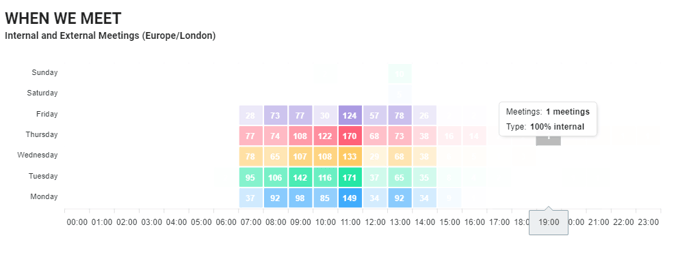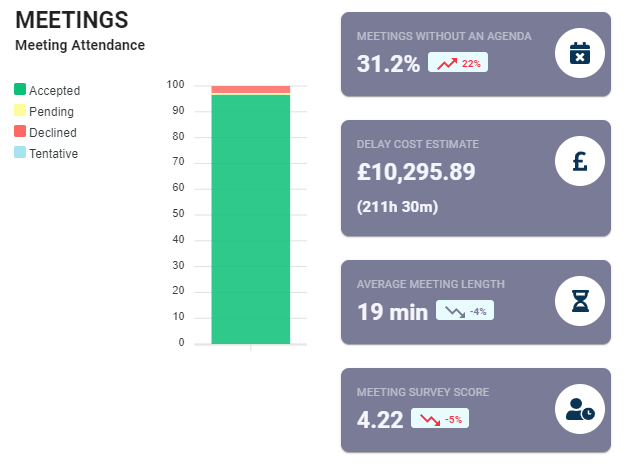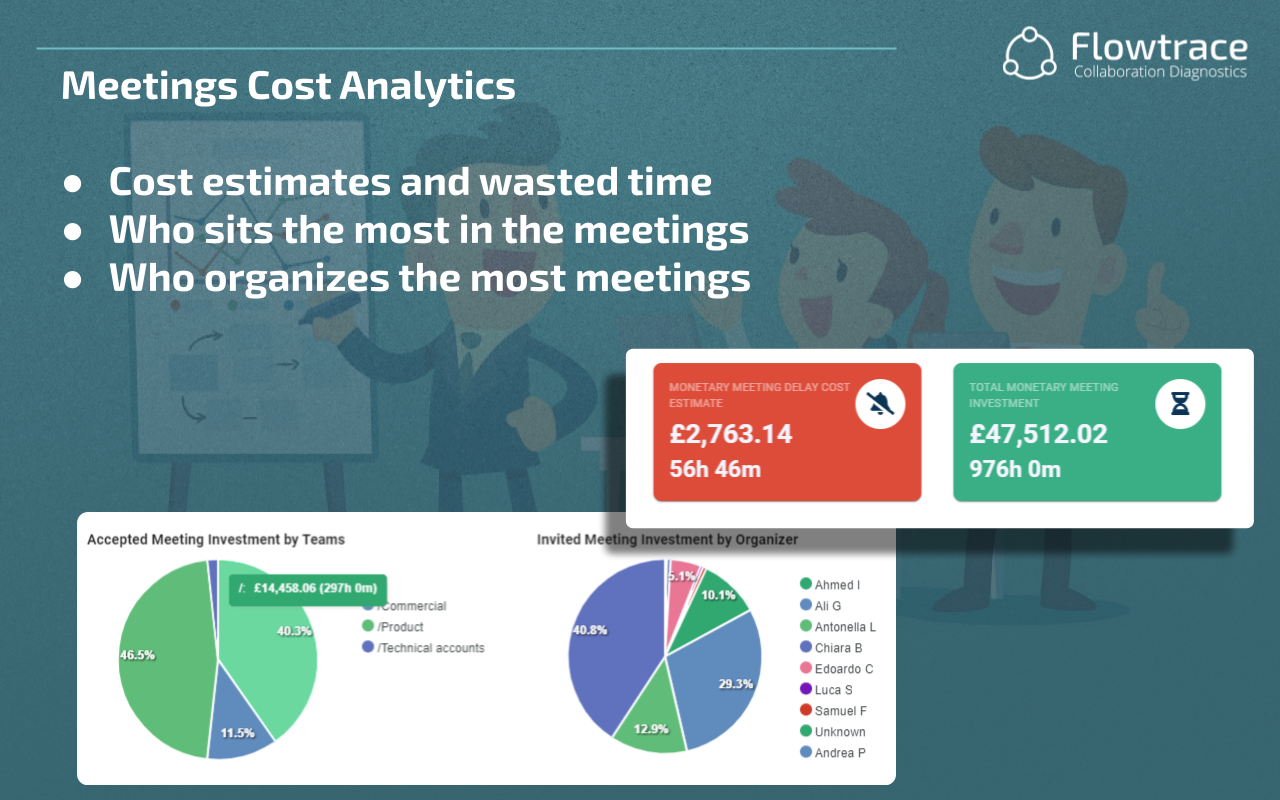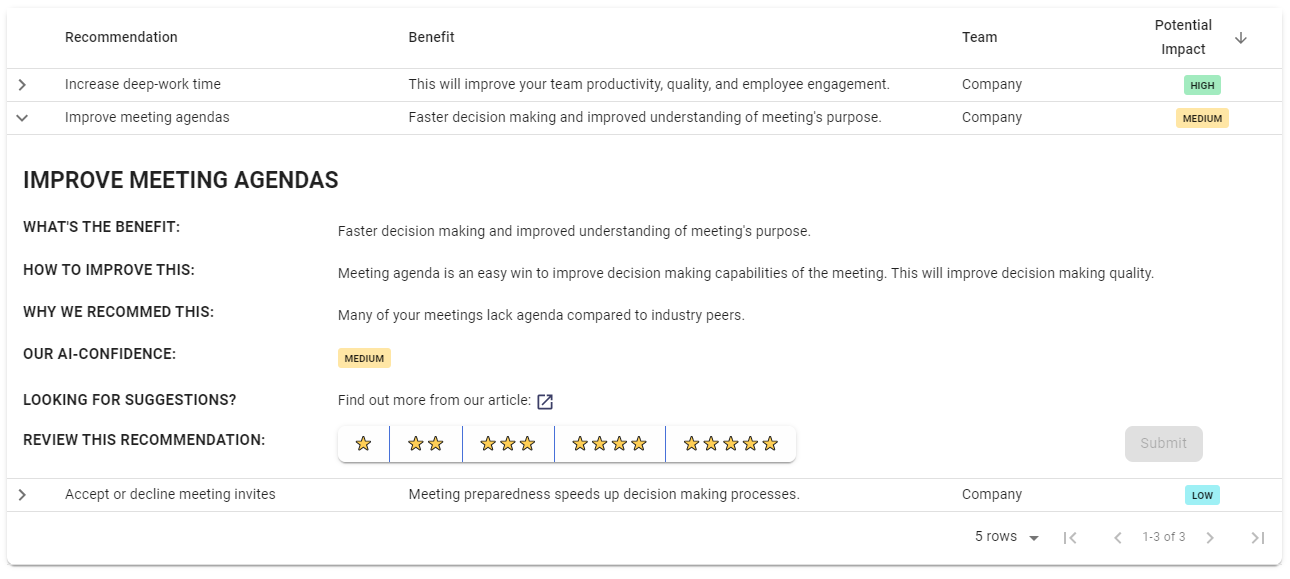Calendar Analytics: A Must-Have Tool for Effective Meeting Culture
Calendar analytics creates KPIs, metrics, and insights to align your team's time, optimize schedules, and enhance your company's meeting culture
Optimize productivity with Google Calendar analytics for tech companies. Improve meeting culture, collaboration, and efficiency using actionable insights and AI recommendations from Flowtrace.
When we consider the broader picture of "the purpose of a work calendar," it becomes evident that calendar functionality has remained relatively stagnant since the transition from physical paper calendars to digital platforms like Microsoft Outlook or Google Calendar. This shift enabled organizations to share and manage meetings transparently, making teams more connected. However, it's worth noting that there haven't been any groundbreaking innovations in calendar systems for the past two decades.
Some advancements have come from tools like Calendly and Hubspot, which offer scheduling assistants that integrate with email, websites, chatbots, and other communication tools. However, the need for more robust calendar analytics remains.
Google’s recent development, “Meeting Quality and Statistics,” primarily targets IT departments, focusing on technical quality rather than the kind of detailed calendar analytics that improve meeting productivity and internal communication efficiency.
When we combine the underwhelming development of Google Calendar features with a report that states "that the cost of poorly organized meetings reaches $399 billion in the U.S. and $58 billion in the U.K alone" it quickly becomes apparent we need to take action and develop innovations to improve internal meeting health.
In speaking with hundreds of startups, founders, and leadership teams, the consensus is clear: calendars hold immense value when utilized for deeper analytics. Combining all company calendars to analyze trends and measure internal meeting culture provides an actionable path to optimize productivity.
This is why we created Flowtrace's Google Calendar Analytics.

Example: Weekly meeting load perspective from Google Calendar analysis
Corporate calendars are underutilized treasure troves of productivity insights. Many organizations still rely on manual calendar analysis to identify productive versus non-productive meetings. This method is time-consuming and often yields outdated insights, making it difficult to keep up with real-time decision-making.
Calendar Analytics Tools, like Flowtrace’s Google Calendar Analytics Tool, eliminate this manual effort by providing real-time insights that automatically surface trends over time. Automated calendar analytics can help reveal hidden inefficiencies that would otherwise be left to gut feelings.
Have you ever wondered if your meeting culture could be improved? Have you asked yourself how? Flowtrace’s Google Calendar Analytics Tool provides the answer, turning calendar data into meaningful insights that enable data-driven decision-making to improve meeting culture, collaboration, and productivity.
When it comes to Google Calendar metrics we need to be mindful of differentiating 'vanity metrics' from 'actionable insights'.
Knowing numbers like average participants or meeting length are not necessarily the most useful metrics, unless they happen to differ from an 'industry standard benchmark drastically.
Flowtrace's Google Calendar Analytics tool focuses on metrics to support actionable insights:
These are only some of the metrics we surface from our client's Google Calendars. Below you can see high-level company KPIs we recommend to all our clients:
 Google Calendar Analytics - Company-wide meeting metrics
Google Calendar Analytics - Company-wide meeting metrics
Tech companies, with their fast-paced and collaborative environments, can greatly benefit from leveraging Google Calendar analytics to optimize time management and streamline operations. Here’s how they can make the most of this tool:
Tech companies often operate in cross-functional teams, where time management is key to maintaining smooth collaboration across departments. Google Calendar analytics allows companies to track how much time employees spend in meetings versus focus work, providing insights into how effectively time is being used. Teams can then adjust their schedules to ensure more time is dedicated to deep work, essential for development, design, and other tech-related tasks that require focus.
![]()
With Google Calendar insights, tech companies can visualize the distribution of meetings throughout the week, identifying peak meeting times or days that are overbooked. By identifying meeting overload or underutilized time, tech companies can optimize meeting schedules to ensure that the busiest teams, such as product development or customer support, aren’t overwhelmed with unnecessary meetings. This helps avoid productivity loss due to meeting fatigue, enabling better workload balance.
Tech companies often have various departments—engineering, product, marketing, and sales—that need to collaborate efficiently. Using Google Calendar analytics, tech companies can track how time is spent across different teams and departments, and adjust schedules to improve collaboration. For instance, analyzing time spent in cross-departmental meetings can reveal if collaboration efforts are inefficient or need restructuring. Ensuring the right people are in the room at the right time enhances project alignment and decision-making.

For tech companies, meeting time is a resource that comes with a cost. Google Calendar analytics can provide data on how time is allocated in meetings, allowing managers to calculate the financial impact of excessive or unproductive meetings. This is especially important for large tech companies where meeting inefficiencies can scale quickly. Monitoring time spent in meetings helps companies optimize costs by cutting down on unnecessary gatherings and keeping meetings within productive limits.
Many tech companies have remote or distributed teams. Google Calendar analytics can help these companies optimize scheduling across different time zones, ensuring that meetings are set at times that accommodate everyone. By analyzing time data, tech companies can avoid conflicts where remote teams face scheduling issues due to time zone differences or overbooked calendars.
Tech companies can also use calendar analytics to schedule meetings at times when employees are most productive. By understanding when teams typically schedule focus time versus collaborative meetings, managers can optimize meeting schedules to align with peak energy levels. This helps avoid scheduling important meetings during times when employees are less focused, such as late in the afternoon.
By effectively leveraging Google Calendar analytics, tech companies can ensure they are optimizing meeting schedules, improving productivity, and cutting unnecessary costs, all while ensuring effective collaboration across teams. Integrating these insights into their daily operations helps tech firms maintain agility in a competitive environment.
Meeting culture, especially internal collaboration meetings in the company should not be considered static and given. This is especially true for fast-growing companies. Usually, the practices and ways of conducting meetings are inherited from the company's early employees.
The stark reality is that the early employees in a high proportion of startups have many other priorities that outweigh developing a good internal meeting culture. We observe in many of our clients that a changing meeting culture is a very conscious process, and sometimes a lot of hard work if certain bad habits have taken hold.
Company-wide analytics keeps you accountable, but in silo, this is not enough to identify what actually needs to be done to improve overall internal meeting health and efficiency.
We provide additional Google Calendar Analytics insights based on team and time filtering where you can compare historical trends to real-time insights, and benchmark your teams among one another. You can find all Flowtrace integrations to your collaboration tools from our integration collection.
It is often the case that some of your teams are wedded to a poorer meeting culture than others, ultimately you want your leadership actions, decisions and initiatives to address the high-impact areas of the organization.
 Complete Meeting Analytics - Team benchmarking and insights
Complete Meeting Analytics - Team benchmarking and insights
We have witnessed amazing success within our client's organizations when leadership teams have led the charge into the need for meeting culture improvements.
Our clients have widely adopted management KPIs which focus on internal meeting productivity and continual improvement of the KPIs become a regular agenda in management meetings.
Introducing a change is one part of your improvement journey, but reinforcing behavioural change is what is really needed to demonstrate a measurable ROI to your business.
Without automated metrics and internal productivity meeting KPIs, most change initiatives typically fall short.
As you delve into the insights provided by our Google Calendar analytics, it's essential to determine the most effective way to improve your meeting culture. With Flowtrace's Google Calendar Analytics, you have the flexibility to either act on your own interpretation of the data or benefit from our AI-powered recommendations.

Our advanced algorithms analyze your calendar metrics and provide personalized, actionable suggestions for optimizing meeting efficiency and productivity. These recommendations are benchmarked against companies like yours. Additionally, our help content offers meeting best practices and tips for implementing these recommendations, ensuring you have all the resources you need to make data-driven decisions to improve your meeting culture.
With the power of our AI and our expert guidance, you can confidently initiate impactful changes that foster better collaboration, engagement, and overall meeting performance.
If you can make continual improvements to your internal meeting culture, in turn, you organically improve your team and employee productivity. When you improve meeting productivity you can super-charge your employee experience and company collaboration. As your company culture becomes more collaborative your employees can relish in the fact they will have more deep work time. When deep work time is analysed and prioritized, more projects and goals are achieved.
Calendar analytics creates KPIs, metrics, and insights to align your team's time, optimize schedules, and enhance your company's meeting culture
Data-driven insights are key to success in remote teams, improving collaboration, productivity and engagement leading to better outcomes for the team.
Discover these 6 benefits of calendar analytics and see how you can improve your company meeting culture and lead more efficient meetings with teams.